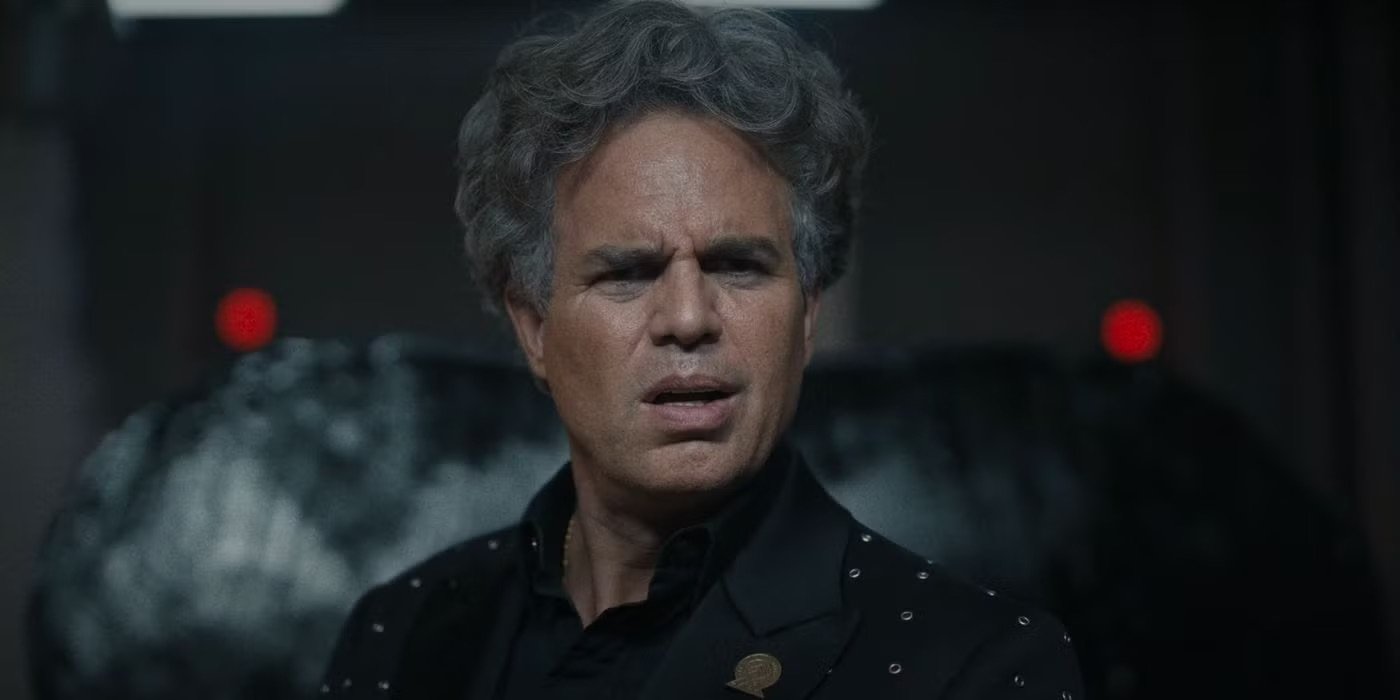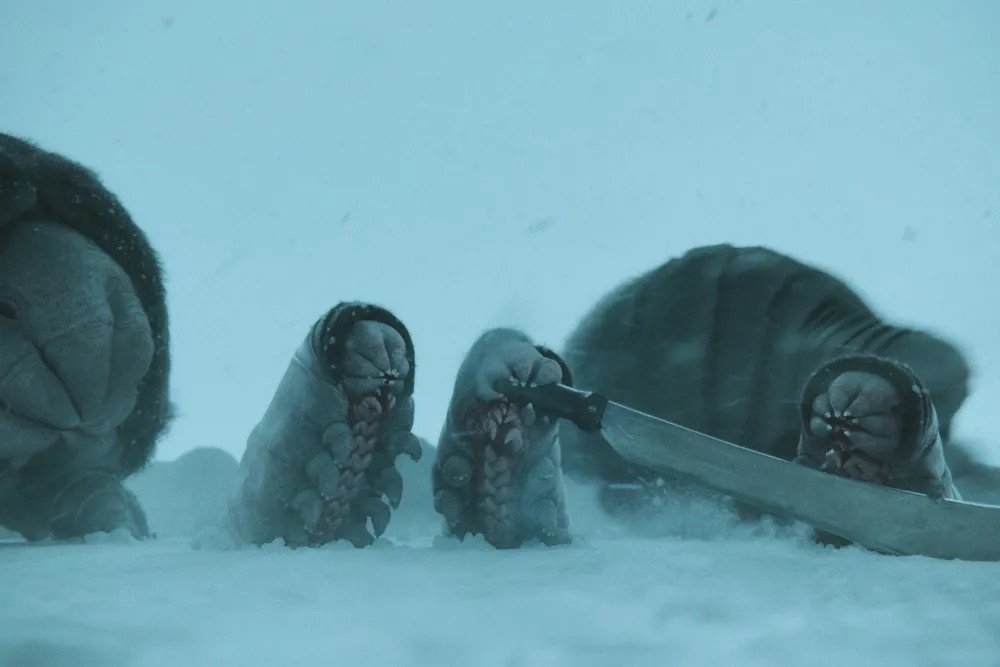Mickey 17: A Film Review
By: Beth Renee
An Uncanny World Not Unlike Our Own
The year is 2054: Earth is quickly becoming uninhabitable due to the climate crisis, and devastating sandstorms are a daily occurrence. The rich have gotten richer and the poor are taken advantage of by predatory loan sharks. This is how our protagonist Mickey (Robert Pattinson) hits rock bottom. With nowhere left on Earth to run, he looks to the stars. Desperate to leave the worsening conditions of Earth, a failed-congressman-turned-wealthy-cult-leader organizes a space expedition to populate and colonize an alien planet. The jokes write themselves.
Aside from the brilliant writing and vision of Bong Joon Ho (best known for his Academy Award-winning 2019 film Parasite), part of what makes Mickey 17 so captivating is its proximity to our present—both figuratively and literally. While many sci-fi stories take place in an unfathomable future (20,000 years in the future for Dune) or an unrecognizable past (think “a long time ago, in a galaxy far, far away”), Mickey 17 takes place a mere 29 years in the future. The language and the customs are familiar to us because it's a reflection of how we live now.
Classism: Now in Space!
In order to get a spot on the exclusive space expedition to the new planet of Niflheim, Mickey signs up to be an “Expendable,” a job that entails the most dangerous and difficult tasks that no one else wants to do. The catch? In the event of his death, Mickey’s body will be cloned and printed out of a machine, with his memories still intact. As the only person who signed up for the position, Mickey is treated like a second class citizen on the ship. It seems everyone is interested in only one thing: what’s it like to die?
Mickey is quickly reduced to this aspect of his job. His personality, desires, and abilities outside of that, are of little consequence to anyone around him except his girlfriend Nasha (Naomi Ackie). As we see montages of Mickey’s first 16 lives, we quickly learn that he is essentially being used as a lab rat. His life is at the whims of a group of mostly disillusioned scientists tasked with making life on Niflheim work. Mickey is sent out in the snow, told to remove his helmet and breathe in any dangerous bacteria in the air. As a result he becomes deathly ill, dying a number of times in order for the scientists to create a vaccine. Animal rights and welfare is a topic that Bong Joon Ho has explored before in his film Okja, so many have made comparisons of Mickey’s treatment to that of animal testing. Just as it seems things can’t get any harder for him, the worst thing that could go wrong, does: Mickey is accidentally duplicated while still alive—meet Mickey 18. This initial conflict sets off a series of consequences for both Mickeys as they try to avoid discovery, knowing that the only solution for duplicates is death.
And who runs this show? Why, that would be the flamboyant and crude Kenneth Marshall (Mark Ruffalo). Complete with dentures, a fake tan, and a wig, Marshall is a showman through and through. After a failed political career, he used his fame to form his own cult in which his followers treat him like a god. He heads the expedition with no knowledge of space, science, or military leadership, but does that stop him? Of course not!
Despite being unqualified and all around ignorant, Marshall and his wife Ylfa (Toni Collette) live in a luxurious suite and eat decadent meals, while the rest of the crew are quartered in tiny spaces with strict rations enforced. They remain focused on their one goal: to colonize Niflheim and populate it with a “supreme pure population.”
This aspect of the story was at times exaggerated, and other times potentially too subtle. When it comes to Ruffalo’s performance of the character, he said in an interview, “At the time when we shot it three years ago, I thought, this is over the top. And now, I realize it’s totally underplayed.” While the themes of white supremacy and colonization were clear to me, there were certainly viewers that came away with no idea of the film’s messages or themes. The sci-fi elements of the film could have potentially distracted some viewers from seeing the universality of the themes presented on screen.
IMAGE: {IMAGE 2}
The Cute and Cuddly Creepers
The indigenous inhabitants of Niflheim are affectionately called the “Creepers.” When Mickey, Nasha, and their exploration group first meet the Creepers, the group is terrified and their negligence results in the death of one of their own. After this incident, Marshall begins a campaign against the alien creatures, demonizing them and declaring them dangerous. Over the course of the film, this escalates from spreading misinformation and propaganda to calling for a full genocide. Given how timely this topic is in terms of our current world affairs, I wish Bong Joon Ho would have fleshed this out more. Marshall jumps from fear and disgust, to war crimes after one interaction with a baby aboard the ship. It would have been more interesting to see the intentional manipulation that goes into demonizing a group of people (or in this case, animals).
Despite Marshall’s smear campaign, we learn that the Creepers are gentle and highly intelligent creatures, capable of a collective consciousness and language. I initially took the Creepers to be representative of any indigenous culture that is forced from their home by colonizers. There is a language barrier and while the Creepers initially help Mickey when he is left for dead, they come to regret that kindness after one of their babies is killed on the ship. However, there are also opinions that this is, again, related to Ho’s strong opinions on animal rights. Despite their size, the Creepers are bug-like in appearance, and Marshall essentially calls for their extermination. Another aspect of their mistreatment is Ylfa’s seemingly unquenchable desire to make their tails into a sauce. There is a cold, mechanical ruthlessness to the way she sees the Creepers as only the food they can produce, not unlike the current state of factory farming.
Where the Film Loses People
To summarize it briefly: this film is doing A LOT. It is tackling everything from climate change and racism, to animal rights and classism. While the latter is the main focus of the film (and the most successfully executed), topics such as political corruption, white supremacy, and the ethics of science also play a role in the main story line, as well as its subplots. This can leave the viewer confused on what message they are meant to leave the theater with.
For example, Mickey is narrating a lot of the story. In the beginning, this does a lot of the world building for us, as he describes the world events that led us to the moment where the story begins. This involves brief glimpses into the conversations surrounding the ethics of cloning and the age-old question of duplicates. This plays a crucial role in setting up the conflict between Mickey 17 and Mickey 18, but only receives a brief few minutes on screen. We also get a look into how Marshall uses religion and fear mongering to manipulate the law and public opinion on cloning for his own personal gain.
For fellow philosophy nerds, there were also a ton of questions regarding Philosophy of Mind, Ethics, and Metaphysics. The most obvious being: What makes a person? What defines personhood? While incredibly entertaining and timely in its political themes, Bong Joon Ho takes on a lot with Mickey 17. While not all of these themes are fully fleshed out, the ones that are, are an undeniable success. Unfortunately, the film did not do well at the box office, bringing in less than $150 million globally, while it needed about $300 million to break even. Despite these losses, I believe that its clever writing and charismatic performance by Robert Pattinson, in combination with the current political climate, will lead to this film seeing a resurgence in the near future.




